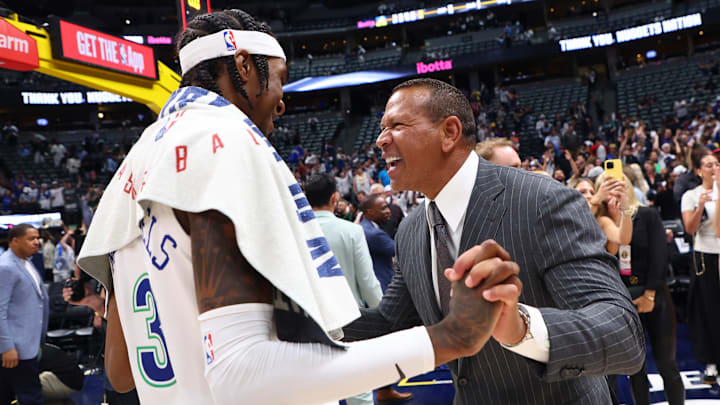In an interesting turn of events, former New York City Mayor and one of the 15 richest men in the world, Michael Bloomberg, has agreed to join the Minnesota Timberwolves ownership group currently led by Marc Lore and Alex Rodriguez.
Former NYC Mayor Michael Bloomberg -- ranked one of richest people in the world -- has agreed to join the Marc Lore and Alex Rodriguez group to buy the Minnesota Timberwolves/Lynx, sources tell me and @ShamsCharania.
— Jon Krawczynski (@JonKrawczynski) June 6, 2024
Story at @TheAthletic: https://t.co/3pU825CwA3
Lore and Rodriguez originally agreed to buy the Wolves in April of 2021 for $1.5 billion—and the deal was supposed to close in March of this year. However, at the end of March, Minnesota's current majority owner, Glen Taylor, boldly stated, "The Timberwolves and Lynx are no longer for sale," after the duo had evidently failed to meet prior contractual obligations.
While Lore and Rodriguez acknowledged the missed deadline, the duo did point out that they had submitted the requisite paperwork to trigger a 90-day extension for the NBA to formally approve the deal. Lore and Rodriguez felt Taylor suffered from seller's remorse as the Wolves' value had soared since the initial agreement.
Following the fall-out, the trio seemed to wait to re-engage until after the season. In early May, between the first and second rounds of the playoffs, a mediation was set between the two parties. Unfortunately for both sides, the mediation was unsuccessful. The conflict then headed for arbitration.
With the arbitration looming, Lore and Rodriguez brought in Bloomberg to aid in their pursuit of majority ownership. According to Jon Krawczynski, Bloomberg's arrival, however, does not have an impact on the arbitration ruling. Since the billionaire came after the March 27 deadline, his inclusion is null.
Nonetheless, Bloomberg's addition to the group is nothing short of impressive. Bloomberg's net worth exceeds $100 billion—far surpassing any of the involved parties. While the former mayor of New York City is expected to contribute a considerable sum, he's not expected to play much of a role behind the scenes.
In fact, Bloomberg recently contributed to an investor group that purchased a majority stake in the Baltimore Orioles earlier this year. Led by David Rubenstein, a co-founder of the Carlyle Group, the group of investors purchased the MLB squad for $1.75 billion.
Now onto his next venture, Bloomberg will play a part in Lore and Rodriguez's prominent purchase. The minority owners were set to pay an installment of $600 million by March 27. With Bloomberg now on board, the sizeable amount should be far easier to assemble.
The implications of whoever takes over the franchise are substantial. The Timberwolves will likely enter the offseason as a second-apron team barring any cost-cutting trades. As it stands, the quintet of Anthony Edwards, Karl-Anthony Towns, Rudy Gobert, Jaden McDaniels, and Naz Reid will combine to earn $172 million—just $6 million below the first-apron.
Historically, the Wolves ownership has declined to shell out exuberant contracts to retain core pieces. Other than Kevin Garnett's league-altering contract in 1997, Minnesota has been reluctant to acquire and retain All-Star-level talent.
Minnesota had only paid the luxury tax in five separate seasons before last season and the Gobert addition. Since Tim Connelly came on board, the Timberwolves have seen far more success. However, success has come with an extended payroll—something Taylor has been willing to pay.
The majority owner even went as far as to say he was worried that if Lore and Rodriguez were to take over, the duo would jeopardize the franchise's ability to compete for a championship due to several cost-cutting measures.
Now with Bloomberg on board, Lore and Rodriguez likely won't need to take cost-reducing actions. Aside from the cost-cutting measures, the minority ownership group achieved quite a bit quickly. Over the last three seasons, the Wolves have combined to go 144-102—the best three-year stretch since the early 2000s.
Although not all success is accredited to ownership, Lore and Rodriguez's active, energetic approach has certainly paid dividends. Add Bloomberg to the mix, and the group has the finances and the enthusiasm necessary to build a dynamic culture.
